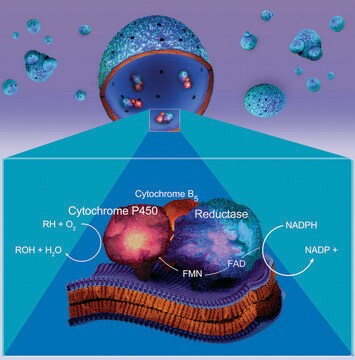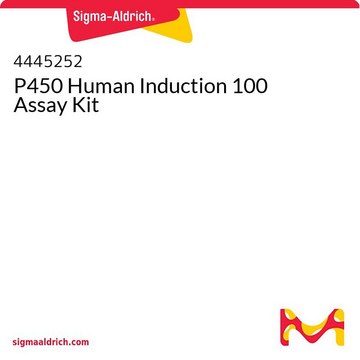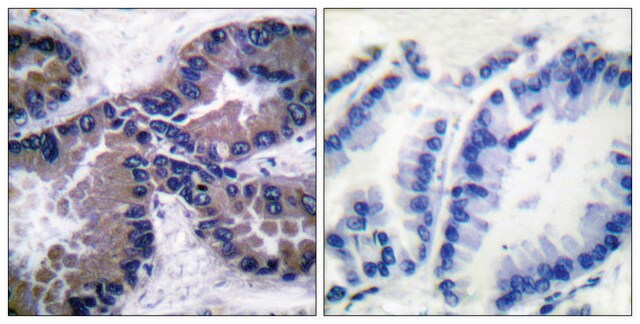MTOXCE1A1
CypExpress™ 1A1 Cytochrome P450 human
Synonym(s):
AHH, AHRR, CP11, CYP1, CYPIA1, P1-450, P450-C, P450DX, cytochrome P450 family 1 subfamily A member 1
Sign Into View Organizational & Contract Pricing
All Photos(1)
About This Item
UNSPSC Code:
12352200
NACRES:
NA.77
Recommended Products
biological source
human
recombinant
expressed in Pichia pastoris
form
dry powder
storage temp.
−70°C
Gene Information
human ... CYP1A1(1543)
Biochem/physiol Actions
Cytochrome P450 enzymes are heme containing monooxygenases which are found primarily in the mammalian liver. They catalyze the oxidative metabolism of xenobiotics. This metabolism is the initial step in the biotransformation and elimination of a wide variety of drugs and environmental pollutants from the body. The gene, CYP1A1, encodes a member of the cytochrome P450 superfamily of enzymes. The cytochrome P450 proteins are monooxygenases which catalyze many reactions involved in drug metabolism and synthesis of cholesterol, steroids and other lipids. This protein localizes to the endoplasmic reticulum and its expression is induced by some polycyclic aromatic hydrocarbons (PAHs), some of which are found in cigarette smoke. The enzyme′s endogenous substrate is unknown; however, it is able to metabolize some PAHs to carcinogenic intermediates. The gene has been associated with lung cancer risk. A related family member, CYP1A2, is located approximately 25 kb away from CYP1A1 on chromosome 15. Alternative splicing results in multiple transcript variants encoding distinct isoforms.
Cytochrome P450 is a heterogeneous family of isozymes whose primary function is to oxidize small molecules, both as a function of intermediary metabolism (e.g., fatty acids) and to detoxify exogenous compounds (drugs or toxins). Some isoforms have narrow substrate specificity, while others are promiscuous.
Features and Benefits
CypExpress™ 1A1 is a permeabilized and stabilized dried yeast powder preparation containing full length, unmodified, human CYP 1A2 and recombinant human NADPH oxidoreductase. Using proprietary processes, CypExpress™ are expressed in Pichia yeast. Following optimal expression, the cells are inactivated, permeabilized and dried to a fine powder. CypExpress™ retains the cellular mechanisms to provide the P450 enzymes with the energy and cofactors to continue to function for long experiments, and can generate larger amounts of metabolite than mammalian microsomes or other genetically engineered expression systems.It is designed for rapid screening of drug metabolites and for scaling up metabolite generation.
Legal Information
CypExpress is a trademark of Oxford Biomedical Research
Storage Class Code
11 - Combustible Solids
WGK
WGK 1
Flash Point(F)
Not applicable
Flash Point(C)
Not applicable
Choose from one of the most recent versions:
Certificates of Analysis (COA)
Lot/Batch Number
Sorry, we don't have COAs for this product available online at this time.
If you need assistance, please contact Customer Support.
Already Own This Product?
Find documentation for the products that you have recently purchased in the Document Library.
B W Yu et al.
Genetics and molecular research : GMR, 14(1), 1076-1084 (2015-03-03)
Numerous studies have evaluated the association between CYP1A1 gene polymorphisms and hepatocellular carcinoma (HCC) risk. However, the specific association is still controversial. The aim of our study was to clarify the effects of CYP1A1 gene polymorphisms (3801 T>C and A2455G)
Kai-Tao Yu et al.
Tumour biology : the journal of the International Society for Oncodevelopmental Biology and Medicine, 35(11), 11183-11191 (2014-08-12)
The cytochrome CYP1A1 gene has been implicated in the etiology of oral cancer. However, the results have been inconsistent. In this study, a meta-analysis was performed to clarify the associations of polymorphisms in CYP1A1 gene with oral cancer risk. Published
Yu Lu et al.
Asian Pacific journal of cancer prevention : APJCP, 15(9), 4071-4077 (2014-06-18)
The effects of CYP1A1 gene polymorphisms on the risk of bladder cancer (BC) remain controversial. We carried out a meta-analysis to clarify the role of CYP1A1 gene polymorphisms in BC. A comprehensive literature search was conducted up to November 20
Rao L Divi et al.
Mutagenesis, 29(6), 409-417 (2014-09-24)
The polycyclic aromatic hydrocarbon (PAH) benzo(a)pyrene (BP) is thought to bind covalently to DNA, through metabolism by cytochrome P450 1A1 (CYP1A1) and CYP1B1, and other enzymes, to form r7, t8, t9-trihydroxy-c-10-(N(2)-deoxyguanosyl)-7,8,9,10-tetrahydro-benzo[a]-pyrene (BPdG). Evaluation of RNA expression data, to understand the
G Pahlke et al.
Toxicology letters, 240(1), 93-104 (2015-10-18)
The Alternaria toxins alternariol (AOH) and alternariol monomethyl ether (AME) have been reported previously to act as activators of the aryl hydrocarbon receptor (AhR) in murine hepatoma cells, thus enhancing the expression of cytochrome P450 (CYP) 1A monooxygenases. Concomitantly, both
Our team of scientists has experience in all areas of research including Life Science, Material Science, Chemical Synthesis, Chromatography, Analytical and many others.
Contact Technical Service







